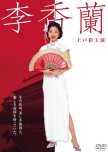Being a history buff, I'm well aware of a coupla Golden Truths which, alas, tend to be vastly ignored by most:
1) there's little - and often just nothing - heroic in war; war is bad, it takes out the worst from people, and that means cowardice, betrayal, lies, atrocities etc.
2) what passes for "history" in the mainstream is actually only the "winners' version";
3) the "losers' version" is often - if not always - at least a little more accurate and true to life; why? Simple: losers can't so easily cover their crimes and sugarcoat the truth as winners do.
All this premise so as to explain why I particularly like Japanese productions about WWII: they aren't propagandistic fairy tales, they show war for what it is, in all its absurdity. Just like this dorama does, all while portraying the real story of Ri Kouran / Li Xianglan / Yamaguchi Yoshiko, a Japanese singer and actress from Japanese-occupied Manchuria.
Commenting on another dorama ("Chanpon Tabetaka") I wrote that it felt "like an asadora's digest", but then I didn't mean it as a compliment; here instead it's really as if they had taken the best and most relevant scenes out of an asadora and managed to make a 4-hour movie out of them. Great job indeed! The script is very well done, the acting very good, Ueto Aya - wearing qipaos/cheongsams most of the time - is positively gorgeous and the historical settings, costumes etc. simply great. I also really appreciated the respect the production showed to realism, i.e. using Russian-speaking actors to portray the main character's friend Lyuba and her family (and adding those small touches that alone can give realism to a scene, like when they're all drinking tea at one point and Lyuba asks if they have any jam - 'cause she would want to drink tea "the Russian way", of course! Small detail, but it shows the authors did their homework, doesn't it?).
Last but not least, some lovely music makes this lil' gem of dorama shine even more. Perfect 10!
1) there's little - and often just nothing - heroic in war; war is bad, it takes out the worst from people, and that means cowardice, betrayal, lies, atrocities etc.
2) what passes for "history" in the mainstream is actually only the "winners' version";
3) the "losers' version" is often - if not always - at least a little more accurate and true to life; why? Simple: losers can't so easily cover their crimes and sugarcoat the truth as winners do.
All this premise so as to explain why I particularly like Japanese productions about WWII: they aren't propagandistic fairy tales, they show war for what it is, in all its absurdity. Just like this dorama does, all while portraying the real story of Ri Kouran / Li Xianglan / Yamaguchi Yoshiko, a Japanese singer and actress from Japanese-occupied Manchuria.
Commenting on another dorama ("Chanpon Tabetaka") I wrote that it felt "like an asadora's digest", but then I didn't mean it as a compliment; here instead it's really as if they had taken the best and most relevant scenes out of an asadora and managed to make a 4-hour movie out of them. Great job indeed! The script is very well done, the acting very good, Ueto Aya - wearing qipaos/cheongsams most of the time - is positively gorgeous and the historical settings, costumes etc. simply great. I also really appreciated the respect the production showed to realism, i.e. using Russian-speaking actors to portray the main character's friend Lyuba and her family (and adding those small touches that alone can give realism to a scene, like when they're all drinking tea at one point and Lyuba asks if they have any jam - 'cause she would want to drink tea "the Russian way", of course! Small detail, but it shows the authors did their homework, doesn't it?).
Last but not least, some lovely music makes this lil' gem of dorama shine even more. Perfect 10!
Considerați utilă această recenzie?

























